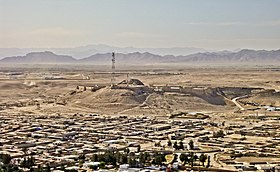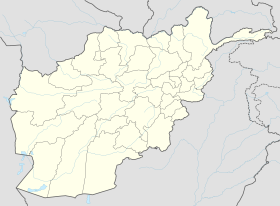| Qalat
Dari: قلات Pashto: قلات | |
|---|---|
| City | |
 The historical citadel in Qalat The historical citadel in Qalat | |
 | |
| Coordinates: 32°6′22″N 66°54′25″E / 32.10611°N 66.90694°E / 32.10611; 66.90694 | |
| Country | |
| Province | Zabul Province |
| District | Qalat |
| Government | |
| • Type | Municipality |
| Elevation | 5,090 ft (1,550 m) |
| Population | |
| • Urban | 49,158 |
| • Metro | 9,900 |
| Time zone | UTC+4:30 (AFT) |
Qalat, sometimes spelled as Kalat (Dari: قلات; Pashto: قلات), and historically referred to as Qalāti Khaljī or Qalat-i Ghilzai, is a city in southern Afghanistan that serves as the capital of Zabul Province. It is linked by Highway 1 with Kandahar to the southwest and Ghazni to the northeast. The city had 5,462 dwellings in 2014, with an estimated population of approximately 49,158 people. Qalat is divided by at least 4 police districts (nahias) with land area of 4,820 hectares.
Barren land is the dominant land use classification 59% of total land. While built-up land use only accounts for 19% of total land use, within that classification there is a large proportion of institutional land (33%). Qalat also has two distinct industrial areas in Districts 2 and 3.
The Qalat Airport is located a couple of miles to north of the city. Next to the airport is the former Provincial Reconstruction Team Zabul, which was built by the United States. On 13 August 2021, the Taliban officially took control of Qalat, becoming the seventeenth provincial capital to be captured as part of the wider 2021 Taliban offensive.
History
Further information: History of AfghanistanIn medieval times, the area was within the heartland of the Khalaj tribe. The Khalji dynasty of India originated from this city. transforming into the Ghilji tribe of Pashtuns.
It was successfully defended by Captain John Halket Craigie and a sepoy garrison against the Afghans in the First Anglo-Afghan War of 1842, and a special medal was awarded to every member of the garison. A political mission came through the city April 16, 1857, en route to Kandahar to broker a new treaty of friendship between the British government at Peshawar and the Amir of Kabul. The party was greeted by a group sent out by the heir-apparent to welcome them and check on the party's supplies. Two companies of infantry were formed so the British could inspect the troops. Afterwards, a shura was held.
Sher Ali Khan captured the city on January 22, 1867. In the battle, he lost a son, Mahmud Ali, killed in single combat by his uncle. His uncle was subsequently killed.
21st century


In an effort to bring economic development to the area, Zabul province's first airstrip was built just outside the city in 2006. It is a dirt runway. The first flight brought in supplies for Provincial Reconstruction Team Zabul and other organizations trying to rebuild the area. Three years later, a girls school was built to attempt to improve education in the area. An initial school supply and prayer mat donation was made, and regular book drops and school supply donations were made until the PRT left in 2013. Clean water programs around the city improved the availability of clean water sources. In 2009, efforts were completed to improve the water system at the old Qalat City Hospital to bring clean drinking water to patients there.
Not all the reconstruction efforts were successful, however. In 2006, construction began on a new economic district for the city. Meant to be an area of commerce and development, ten million dollars and three years later, most of the buildings are unoccupied, unusable either due to lack of the skills to maintain the buildings or due to a lack of need for the building. The governor of Zabul refused to move into the new house, citing the lack of security.
Anne Smedinghoff, a 25-year-old American diplomat, was killed by a suicide car inside the city in the spring of 2013.
Climate
Qalat features a semi-arid climate (BSk) under the Köppen climate classification. The average temperature in Qalat is 13.6 °C, while the annual precipitation averages 283 mm.
July is the hottest month of the year with an average temperature of 27.5 °C. The coldest month January has an average temperature of -2.9 °C.
| Climate data for Qalati Ghilji, elevation 1,565 m (5,135 ft) | |||||||||||||
|---|---|---|---|---|---|---|---|---|---|---|---|---|---|
| Month | Jan | Feb | Mar | Apr | May | Jun | Jul | Aug | Sep | Oct | Nov | Dec | Year |
| Mean daily maximum °C (°F) | 9.3 (48.7) |
11.1 (52.0) |
17.3 (63.1) |
26.0 (78.8) |
31.2 (88.2) |
36.7 (98.1) |
38.4 (101.1) |
37.4 (99.3) |
32.9 (91.2) |
26.5 (79.7) |
18.3 (64.9) |
12.8 (55.0) |
24.8 (76.7) |
| Mean daily minimum °C (°F) | −2.5 (27.5) |
−1.0 (30.2) |
3.7 (38.7) |
9.0 (48.2) |
12.6 (54.7) |
16.7 (62.1) |
18.6 (65.5) |
17.0 (62.6) |
10.8 (51.4) |
5.5 (41.9) |
0.6 (33.1) |
−1.7 (28.9) |
7.4 (45.4) |
| Average precipitation mm (inches) | 31 (1.2) |
113 (4.4) |
65 (2.6) |
27 (1.1) |
1 (0.0) |
0 (0) |
0 (0) |
0 (0) |
0 (0) |
2 (0.1) |
20 (0.8) |
44 (1.7) |
303 (11.9) |
| Source: FAO | |||||||||||||
Demography
Further information: Demography of AfghanistanThe population of Qalat is around 49,158 people, while the province has somewhere around 700,000 people.
Economy
Further information: Economy of AfghanistanThe main source of income of Qalat residents is agriculture, trade, and transport. After the Tori Dam is located on the Tarnak River next to the city.
Sport
Further information: Sport in AfghanistanCricket and association football are the most popular sports in the area. The Afghanistan Cricket Board is building a cricket stadium in the city.
Notable sites
- The local skyline is dominated by a fortress constructed by the forces of Alexander the Great (see: Qalat (fortress)).
- Ghar Bolan Baba, a 730m deep cave historically used for religious purposes
References
- ^ "The State of Afghan Cities Report 2015". Archived from the original on 31 October 2015. Retrieved 22 October 2015.
- "The Forgotten Afghan Province That Is A Key Taliban Stronghold". RFE/RL. December 16, 2018.
- ^ "Zabul Provincial Overview". Naval Postgraduate School. March 2017. Retrieved 2022-07-09.
- "Security ensured, residents may celebrate Eid fearlessly: Zabul police". Pajhwok Afghan News. July 9, 2022. Retrieved 2022-07-09.
- "The State of Afghan Cities Report 2015" (PDF). United Nations Human Settlements Programme. p. 100. Retrieved 2015-10-22.
- USAID/Afghanistan: First Airstrip in Zabul Province Archived 2007-08-07 at the Wayback Machine
- "Taliban sweep across Afghanistan's south, take 3 more cities". AP NEWS. 2021-08-13. Archived from the original on 13 August 2021. Retrieved 2021-08-13.
- Ashirbadi Lal Srivastava (1966). The History of India, 1000 A.D.-1707 A.D. (Second ed.). Shiva Lal Agarwala. p. 98. OCLC 575452554:"His ancestors, after having migrated from Turkistan, had lived for over 200 years in the Helmand valley and Lamghan, parts of Afghanistan called Garmasir or the hot region, and had adopted Afghan manners and customs. They were, therefore, wrongly looked upon as Afghans by the Turkish nobles in India as they had intermarried with local Afghans and adopted their customs and manners. They were looked down as non Turks by Turks."
{{cite book}}: CS1 maint: postscript (link) - Abraham Eraly (2015). The Age of Wrath: A History of the Delhi Sultanate. Penguin Books. p. 126. ISBN 978-93-5118-658-8:"The prejudice of Turks was however misplaced in this case, for Khaljis were actually ethnic Turks. But they had settled in Afghanistan long before the Turkish rule was established there, and had over the centuries adopted Afghan customs and practices, intermarried with the local people, and were therefore looked down on as non-Turks by pure-bred Turks."
{{cite book}}: CS1 maint: postscript (link) - Radhey Shyam Chaurasia (2002). History of medieval India: from 1000 A.D. to 1707 A.D. Atlantic. p. 28. ISBN 81-269-0123-3:"The Khaljis were a Turkish tribe but having been long domiciled in Afghanistan, had adopted some Afghan habits and customs. They were treated as Afghans in Delhi Court. They were regarded as barbarians. The Turkish nobles had opposed the ascent of Jalal-ud-din to the throne of Delhi."
{{cite book}}: CS1 maint: postscript (link) - The Khalaj West of the Oxus, by V. Minorsky: Khyber.ORG. Archived June 13, 2011, at the Wayback Machine; excerpts from "The Turkish Dialect of the Khalaj", Bulletin of the School of Oriental Studies, University of London, Vol 10, No 2, pp 417-437 (retrieved 10 January 2007).
- Chisholm, Hugh, ed. (1911). "Kalat-i-Ghilzai" . Encyclopædia Britannica. Vol. 15 (11th ed.). Cambridge University Press. p. 639.
- Bellew, Henry Walter (1862). Journal of a Political Mission to Afghanistan in 1857, Under Major Lumsden. Smith, Elder and Co.
- Our Punjab Frontier: Being a Concise Account of the Various Tribes by which the North West Frontier of British India is Inhabited. Calcutta, India: Wyman Bros. Publishers. 1868. p. 26.
- "First Airstrip in Zabul Province | U.S. Agency for International Development". www.usaid.gov. Archived from the original on 2015-10-26. Retrieved 2015-06-29.
- "Zabul PRT opens new girls' school in Qalat > U.S. Air Forces Central Command > Article Display". www.afcent.af.mil. Retrieved 2015-06-29.
- Spero, Domani. "Zabul Attack: Were They Walking in a Red Zone?". Diplopundit. Retrieved 2015-06-29.
- tSgt Jefferson, Oshawn (June 3, 2010). "Zabul Province completes projects for progress".
- Burrington, Megan. "G.I. Dough: Money as a Weapons System". Retrieved 2015-06-29.
- "The Army's $10M Afghanistan Flop". ABC News. 2009-07-30. Retrieved 2015-06-29.
- "Dad of slain diplomat: 'It was a great adventure for her'". CBS News. April 7, 2013. Retrieved 2013-04-07.
- "Anne Smedinghoff, U.S. Diplomat Killed in Afghanistan 'Loved the Work She Was Doing'". ABC News. April 7, 2013.
- "U.S. diplomat died 'doing what she loved' in Afghanistan". CNN. April 8, 2013.
- "World-wide Agroclimatic Data of FAO (FAOCLIM)". Food and Agriculture Organization of United Nations. Retrieved 10 November 2024.
- "Re-enumeration of Zabul population urged". Pajhwok Afghan News. July 30, 2011. Retrieved 2022-07-09.
- "NSIA estimates Afghanistan population at 33.6m people". Pajhwok Afghan News. July 8, 2021. Retrieved 2022-07-09.
- "The State of Afghan Cities Report 2015" (PDF). United Nations Human Settlements Programme. p. 12. Retrieved 2015-10-22.
- The Economist, v. 376 - 2005
- Atlas of the great caves of the world. Paul Courbon, Claude Chabert, Peter Bosted, Karen Lindsley. Cave Books, 1989. p. 21.
External links
- Price of foodstuff, fuel rising in Zabul, Qalat city on YouTube (Ariana News, Jan. 28, 2023)
| Zabul Province | ||
|---|---|---|
| Capital: Qalati Ghilji | ||
| Districts |  | |
| Populated places | ||
| Other | ||